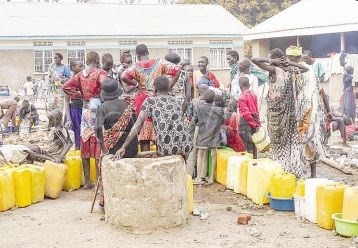Urban refugees struggle with COVID-19 restrictions
Aug 12, 2020
There are 230, 000 South Sudanese refugees in Adjumani camps

COVID-19|REFUGEES|LOCKDOWN
More than 2,000 South Sudan refugees who have settled in Gulu city, as urban refugees, are unable to access their monthly food rations due to the transport costs and restrictions, plus limited space per place.
In 2016, thousands of South Sudan nationals fled their homes to Uganda following the conflict between government forces and opposition factions.
Subsequently, refugees who fled to Uganda and registered at different settlements across northern Uganda chose to stay in urban centres rather than refugee settlements in order to access better services, such as schools for their children, while running income-generating projects for their personal growth.
Lockdown effects
However, today, many refugees who settled in Gulu city suburbs cannot access refugee settlements for their monthly food donations. Adjumani, for example, was affected by the June presidential directive that limited movement as a way to control the spread of coronavirus.
Angelina Agok, 28, a mother of three, says she used to plait women's hair and earn at least sh30,000, but her income was crippled when salon businesses were closed in the first part of the lockdown.
"The money I raised by plaiting hair helped me buy basic needs, such as salt, soap and food. Life was moving on well and I did not even feel like a refugee," Agok recalls.
Agok's husband, a carpenter, remained in South Sudan when the war broke out. Being the head of the family, he could not bear the thought of moving to a foreign country and depend on food aid. He used to send money at the end of the month to his family in Uganda. Much as their economic life before the lockdown was not what they dreamed of; it was way better than what they have now.
"My husband's business is suffering. Who wants to buy furniture when they can barely have a meal?" Agok says, adding that COVID-19 has affected more livelihoods of refugees.
"I have eliminated items such as sugar from my diet. I do not remember when I last bought a kilogramme of meat and bread is a luxury," she adds.
Pauline Ayotto, the LC1 chairperson of Kasubi central, a village which hosts a greater percentage of the urban refugees in Gulu, acknowledges that the biggest challenge among the urban refugees is shortage of food since the majority of them are jobless.
"Even those who remained in South Sudan and were sending financial support to their families in Uganda have lost their jobs due to the pandemic.''
Ayotto said they appealed to the Gulu district COVID-19 task force to help urban refugees with food relief, but they are yet to get a response.

Some of the refugees who opted to stay out of the refugee settlements.
Over 1,000 refugees
Gulu district chairperson Martine Ojara Mapenduzi said there are more than 2,000 South Sudanese refugees living in Gulu city. However, he said the task force cannot help them because they are already overwhelmed with the number of vulnerable people requesting for food aid and other basics. Every month, each refugee is given 8kg of maize flour, 0.9 litres of cooking oil, 1.5kg of porridge flour and 0.15kg of salt.
There are 230,000 South Sudanese refugees in the 19 settlement campsin Adjumani district who fled the war that forced about 1.5 million South Sudanese to flee to Uganda, according to statistics from the United Nations High Commissioner for Refugees (UNHCR).
William Manyok, an official at the Refugees Welfare Council (RWC) that oversees the 19 settlements in Adjumani, says he has received many calls from urban refugees who are stuck with no means to reach the settlements to collect their monthly food rations.
"Some refugees opted to stay out of the refugee settlements in order to access good schools for their children, while others started businesses, but when COVID-19 broke out, their socio-economic livelihoods were restrained,'' Manyok said.
He said he has reached out to the settlement leaders to have engagements with the Office of the Prime Minister (OPM) and UNHCR on how best to rescue the refugees.
Titus Jogo, the OPM refugee desk officer in Adjumani district, said: "Food items for May and June have been distributed to refugees. Initially, the guideline indicated that if you do not turn up during the distribution exercise, you do not get, but because of the COVID-19 travel restrictions, those who missed can now be considered."
Plight of urban refugees in Kampala
Urban refugees in Kampala continue to cry for food. Since most live in rented houses, their condition is challenging. "We feel abandoned, with nowhere to get food, yet we have children to feed and rent to pay. In a foreign land, it is much harder to survive now that our businesses have been paused," Latifa Murefu, a Congolese tailor in Wakiso district, said.
The state minister for relief and disaster preparedness, Musa Ecweru, advises urban refugees who are not employed to return to the settlement areas. "I will talk to those who are not doing anything and encourage them to return to the settlements, where it is easy for the Government to support them," Ecweru said.
